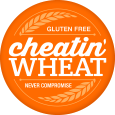- Oct 26, 2016
Since going gluten free, I have had a number of people ask me if I think they should try a gluten free diet. My immediate response is to ask the following questions: Why? What issues or symptoms are you trying to solve? What do you know about gluten? Do you know how to cut gluten from your diet? Have you talked to a doctor, nutritionist or any other healthcare professional? Usually, this litany of questions gets them thinking critically and hopefully seeking out the correct person to respond to their medical issues. However, it is important to recognize that this is becoming a common question/consideration and is worth talking about.
A quick search shows there are many blogs and bloggers extolling the virtues of a gluten free diet and giving lengthy lists of reasons to go gluten free. Conversely, there are those who rage against the gluten free trend calling it unnecessary, a fad and downright unhealthy. Not to mention how bleak and terrible your life will be once you are forced into eating brown rice flour blends.
Personally, I like to separate gluten free foodies into two main categories; those who need to eliminate gluten from their diet and those that choose to eliminate gluten from their diet. This is by no means a simple or casual distinction and is not meant to diminish anyone who is acting out of choice. So let's address each in turn.
Gluten Free by Necessity
- You have celiac disease. When people with celiac disease consume gluten containing foods, their body stages a war that takes a toll on the villi of the small intestine. Repeated exposure and damage leads to the inability to absorb vital
 nutrients, such as calcium and iron. **Left undiagnosed or untreated, celiac disease can result in severe nutritional deficiencies such as osteoporosis and anemia. It can also lead to other autoimmune disorders, extreme headaches and fatigue, infertility, chronic joint pain, neurological problems, etc. The only treatment is to adopt a strict, gluten free diet.
nutrients, such as calcium and iron. **Left undiagnosed or untreated, celiac disease can result in severe nutritional deficiencies such as osteoporosis and anemia. It can also lead to other autoimmune disorders, extreme headaches and fatigue, infertility, chronic joint pain, neurological problems, etc. The only treatment is to adopt a strict, gluten free diet. - You have gluten sensitivity yet do not test positive for celiac disease. Unlike celiac disease, gluten sensitivity does not manifest itself with the destruction of the villi in the small intestine. However, many people may still experience severe abdominal and digestive issues, neurological complications, and other symptoms that look a whole lot like celiac disease. Again, becoming gluten free and strict adherence to a gluten free diet is the usually the best coarse of action.
Gluten Free by Choice

A survey from the consumer research firm the NPD group states that "30% of adults are interested in cutting or reducing gluten from their diets." If you don't fall into number 1 or 2 from above, then you are making a choice to be gluten free. The choice may be medically inspired and the explanations may go something like this:
- "I have an autistic child and there is research to support the idea that a gluten free, casein free diet can reduce the symptoms. Our whole family just eats gluten free."
- "I have IBS (Irritable Bowel Syndrome) and I have found eating gluten regularly exacerbates my symptoms. I therefore choose to minimize my exposure."
- "I have a wheat allergy. And although gluten free and wheat free are not the same thing, they are intertwined enough that it is easier to just be gluten free!"
- "I suffer from MS and have found eating gluten free reduces my inflammation."
Or the choice may be more about the frustration with our food culture and sound a little like this:
- "I choose to reduce or eliminate gluten in an effort to eat healthier and make more room for fruits, vegetables, legumes and other diverse grains in my diet."
- "I am fed up with the processed food system and want to be more cognizant of what is in my food and therefore what I put in my body. Eliminating or reducing gluten means reading every label first so I know exactly what I am eating."
By necessity or by choice, I say bravo for taking your diet seriously. After all, the nutritional use of the word diet derives from the Classical Greek "diaita". This noun, that meant a way of living, is a more holistic look at food and lifestyle rather than the reductionist view of "diets" as abstinence, restraint and weight loss. Whatever leads you to a gluten free lifestyle, we support your efforts and hope Cheatin' Wheat can be a resource for delicious food, recipes, and gluten free information. Just contact us.
** http://www.mayoclinic.org/diseases-conditions/celiac-disease/symptoms-ca...





 Find our products
Find our products FAQs
FAQs Testimonials
Testimonials R&D Projects
R&D Projects